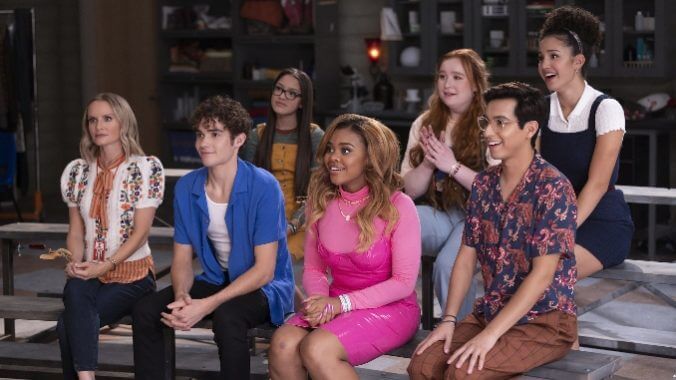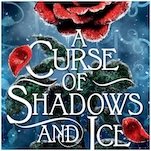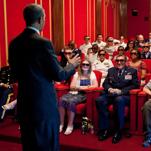I’ll get to that song (or, as it ultimately turned out, those three songs) in a moment, I promise. I mean, it’s High School Musical: The Musical: The Series! The kids spend the final season mounting a production of High School Musical 3 while at the very same time working as featured extras on the set of High School Musical 4: The Reunion! It was a musical squared, then squared again. Obviously I’ll get to the songs!
But when a Disney project’s puppy dog teen protagonist breaks not only the famously PG brand’s f-bomb seal, but also the scrupulously aesthetics-only fourth wall that had, up until that point, held strong for four madcap seasons, you gotta start there. Because while HSMTMTS creator and showrunner Tim Federle had already led his creative team to go BIG in topping the meta-ness of the series’ already over-the-top premise in the second and third seasons—up to and including the introduction, in Season 3, of a real (fake) documentary film crew* filming a real (fake) documentary of the real (fake) East High Drama Students mounting a production of the real (real!) Frozen musical at their fake (fake) summer camp, followed by this latest escalation in Season 4 of the invention of a fake (but possibly canon?) High School Musical 4 reunion movie that real (real!) HSM actors were coming to the real (fake) East High to film at the same time as the real (fake) East High Drama Students were meant to be mounting their own version of the completely imaginary theatrical adaptation of High School Musical 3—it was Ricky’s literally explicit breaking of the fourth wall that broke me.
(*A real-but-fake documentary film crew which, very much not for nothing, was filmed being sneaky by the imaginary-but-real documentary film crew which has been following around our East High characters since Season 1. It is, as one Ricky Bowen might say, a real mindf–k!)
Broke me, to be clear, In the best way possible. Because not only does Ricky’s outburst flip the entire purpose of the series’ documentary narrative tool on its head (see my Season 1 review for more on how I thought Federle was using this device)—and at the last possible moment!—but it does so in the least f–king on-brand Disney(+) way imaginable. I mean, when the family entertainment juggernaut that is Disney+ made its leap into streaming in November of 2019, it did so on HSMTMTS’s cheekily earnest wings. The premise was zany enough to pique the interest of childless young millennials who might shell out for a subscription to recapture the DCOM magic of their youth, but safely PG enough that parents of precocious tweens and young teens would feel safe to risk the same. Sure, the pilot episode may have been a bit cheekier than either demo might have been anticipating, but even still, audience and critics alike came to HSMTMTS firm in their understanding that if a Disney project exists to do anything, it exists to sell Disney. Not just the park experience, the merch, or the Radio Disney-juiced album sales, but the idea of Disney. And the idea of Disney is not only extremely profitable, it’s very much not Ricky Bowen dropping an anxious f-bomb as he frets he’s about to lose the (second) true love of his high school life to wild global fame.
And yet, the f–k is perfect. It works. It pierces the dramatic tension in the exact way the show needs, at the exact right moment, with the same ineffable “this is both so very real and so very not” comedic alchemy that Federle and his wildly talented crew of writers, directors, and actors found so many times throughout the series’ short four seasons.
Some of these moments have hinged on similarly shocking language choices, like Big Red (Larry Saperstein) dropping the series’ first hell early in the pilot, Miss Jenn (Kate Reinders) saying “Don’t underestimate me, I come from strong stock. My mother bounced back from an autopsy!” in the episode that followed, and the crew’s (not actually) French North High nemesis pulling a middle finger out of his pocket to wave in Big Red’s face in the same series finale episode. Others, though, leaned on absurdity: Season 2’s “I call it my THINKIN’ jazz!” (from Joe Serafini’s sweet-as-sugar Seb, who not for nothing played a genderbent Sharpay in the first season’s rendition of High School Musical, the musical); Season 3’s unholy trinity “spiders, ghosts, [and] men’s rights activists” (from Dara Renée’s inimitable Kourtney); and Season 4’s running gag about (fake) kid show Mark and Spark’s controversial gallbladder surgery episode.
More often than not, though, the real magic has simply been in the right read meeting the right line, like Frankie A. Rodriguez’s delivery of “Mr. Bluh!?” and Bassett’s perfectly awkward “I never saw it! I’ve never seen that program!” in the Season 4 opener (what teen uses the word program!), or Sofia Wylie’s every earnest reference in the finale to Romeo & Juliet as being “based on some famous play” that she’s “really excited to read” because she’s “heard it’s incredible.” (Following, recall, four straight seasons of staggering Gen Z fluency in all things High School Musical. The cheek of this show! I swear.)
So to get back to Ricky’s who the f–k?? of it all: While that may not have been the finale’s literal final note, I’d argue that, at least from a rhetorical perspective, it was absolutely the series’ highest. And not because it put one of George Carlin’s seven words—bleeped though it may have been—in the mouth of a wholesome Disney teen, but rather because it was, ultimately, so very much of a piece with the gleefully brazen, ever-escalating envelope-pushing HSMTMTS had been engaged in from jump.
Which, of course, brings us back to the gleefully brazen, envelope-pushing trio of songs that the series bowed out on: Ricky’s “Love You Forever,” which shoots proverbial fireworks off behind his and Gina’s (Wylie) slow-burn romantic arc; the East High Drama Club’s celebratory post-show take on “Born to Be Brave,” which was originally performed by Renée and Olivia Rodrigo in way back in the first season; and, finally, the whole HSMTMTS cast’s emotional post-credits rendition of Wicked’s “For Good,” which A) puts a clever bow on Miss Jenn’s coulda-woulda-shoulda Wicked origin story, and B) underscores the very real musical-theater-kid earnestness at the series’ heart.
Individually, any one of these songs could have served as the musical send-off for a less ambitious show. But for a project as layered and witty as HSMTMTS, piling all three on top of each just reflects the self-aware, nesting-doll maximalism that’s been the series’ signature from the start. A vertically synergistic reimagining of a deeply meme-able mid-aughts DCOM phenomenon and a love letter to the DCOM genre. A boundary-pushing send-up of the goofy emotional excesses of Disney’s traditional teen offerings and an earnest exploration of the tender, funny, transformative power performance can have for anyone (and especially goofy, emotionally excessive teens) who haven’t yet found their people. It’s been a lot to balance! Add to all that a massive cast, which featured on average a dozen core characters in any given season—one of whom (Rodrigo) became such a massive global pop sensation between the first and second season that she had to peace out from the series altogether—and honestly, three big final numbers might have been the bare minimum the series could have gotten away with while staying true to its own ambitious vision. (One song for each colon in the title; seems only right.)
And this ambition, to my mind, extends beyond the artistic. All Barbenheimer summer long, it seems, we’ve been having a conversation about the line between art and capitalism. Can you do the thing while also subverting the thing? That is to say, can you put enough frothy fun on the screen to both participate in the marketing machinery of “an IP company that sells loads of toys,” as critic Willa Paskin put it in a recent New York Times profile of Barbie director and co-writer Greta Gerwig, and also subvert the machinery itself?
To hear Gerwig tell it, the answer is an unequivocal yes. To follow the Barbie discourse, though, the answer is… no, not really.
But if with Barbie Gerwig is trying to both do the thing and subvert the thing, I’d argue that in High School Musical: The Musical: The Series, Federle managed to successfully both subvert the thing and do the thing.
Hear me out: In both cases, that both/and has the capacity to fuel, in the heart of a certain kind of viewer, no small amount of discomfort at the tension inherent in being such a willing mark to the gods of capitalism. Mattel is not suddenly a paragon of sustainable mass toy production for sending Barbie through a Feminism 101 course. Similarly, Disney not suddenly a paragon of progressive values for greenlighting four full seasons of a show that saw the casting of a genderbent Sharpay in Season 1, the casting of a “non-traditional” Belle in Season 2, the inclusion of a safe sex speech in Season 4, and not one, not two, not three, not even four, but five queer relationships throughout the series (two of which featured characters coming out as bi, and one of which featured JoJo Siwa). However, in pairing HSMTMTS’s subversive undercurrent with an even stronger overcurrent of earnestness, Federle has managed to take the product all Disney shows are understood to be marketing—that is, the Disney brand, itself—and transmute it, ultimately marketing, instead, a radically obvious understanding that the kind of expansive, empathetic, progressive world he built with and for the real/fictional teens of his real/fictional East High Drama Club can itself be the Disney brand.
Or to quote Mack (Matthew Sato), Series 4’s fake High School Musical 4 star (formerly of Gina’s favorite and equally fake Blue’s Clues knock-off, Mark and Spark): “Is it woke? Is it throwback? What if it’s both? It’s High School Musical 4!”
I realize this might seem like a dangerously uncynical position for a critic to take. But given the bizarre way in which the series’ final and most ambitiously off-but-on-brand season was released—that is, all at once, as a binge, in the middle of not just the busiest few TV premiere weeks of the summer, but also a historic double-barrelled strike by writers and actors for a fair contract that’s necessarily going to drive the streamers’ pipelines dry sooner rather than later—it sure seems like Disney understood what the full power of High School Musical: The Musical: The Series could be. Having eight episodes of a show as dense and fun and crescendo-ready as HSMTMTS to parcel out, one at a time, over a two month period? (Which, for the record, is how each of the series’ previous three seasons were released.) Disney+ should have seen that for the gift that it was! And yet, they chose to drop it like a hot potato, in a way that all but ensured any meaningful discourse about What It All Means would be cut off at the root. That I have such a thoughtful, flexible editor in Clare here at Paste is genuinely the only reason I’m able to be talking about the show at all now, weeks after it dropped as a useful digital media “peg.”
Perhaps unsurprisingly, for as successful as I think Federle and the rest of the HSMTMTS team was in setting and living up to their own uniquely high (and fun!) expectations, I find myself coming back here at the end of everything to the note I left off on in my very first review:
Here’s the thing: The corporate behemoth that Disney has become is literally the only operation in town that could produce something as vertically integrated and as richly and winkingly self-referential as High School Musical: The Musical: The Series. And for all that it’s both fun and fascinating to see the company use its new Disney+ platform to send up its own fairly conservative cable television past, the fact remains that turning the creative ecosystem into such a Disney-fied monoculture isn’t, you know, great. There is [a] cultural/moral knot at the heart of Disney+ being able to pull off something like High School Musical: The Musical: The Series, and it is important for critical voices to pick at it.
Because yeah, artistically Federle et al may have pulled off both subverting the thing and doing the thing, but ultimately it’s Bob Iger and Disney(+) who will have the final say in at least the corporate legacy that this show leaves behind.
All that said, in the end it’s hard for me to think of a show that’s brought me more joy in the last handful of years than High School Musical: The Musical: The Series. Certainly there aren’t any other shows I’m budgeting these days to buy a box set of. Guess now all that’s left to do is hope that Iger won’t disappear it from reality for a one-time tax break before I get the chance.
In the meantime, HSMTMTS, love you forever.
High School Musical: The Musical: The Series is now streaming in its entirety on Disney+
Note: This piece was written during the 2023 WGA and SAG-AFTRA strikes. Without the labor of the writers and actors currently on strike, the series being covered here wouldn’t exist.
Alexis Gunderson is a TV critic and audiobibliophile. She can be found @AlexisKG.

















































































